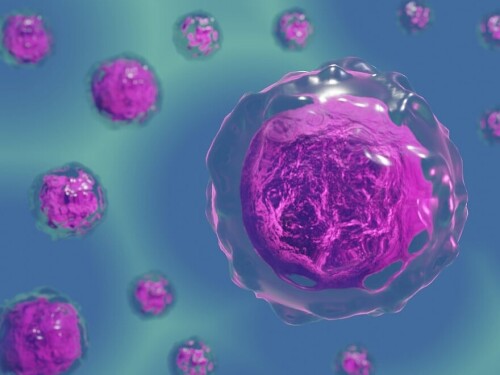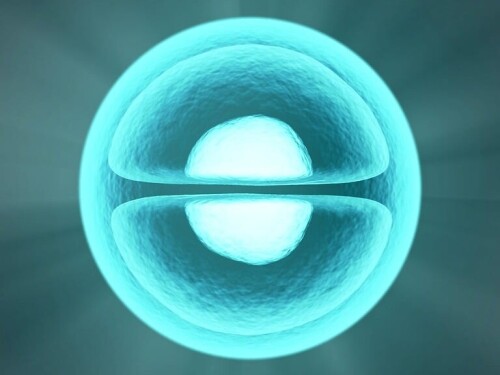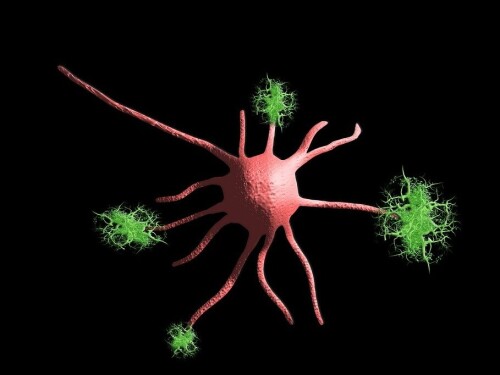As nurses, we receive questions from our patients regarding the possibility of future therapies for MS.
In this blogpost, we highlight developments regarding hematopoietic stem cell transplantation and two potential future therapies that were discussed at the recent (September 2024) Congress of the European Committee for the Treatment and Research in Multiple Sclerosis society, the world’s largest gathering of MS healthcare professionals.
Despite still being experimental, experience with hematopoietic stem cell transplant (HSCT) is increasing and this was highlighted by two representative real-world studies presented at the congress.1,2
An uncontrolled real-world study of 363 patients with MS in the UK (38% with progressive MS) found that, at 2 years and 5 years after undergoing HSCT, 94.6% and 88.6% of patients were in relapse-free survival (RFS) respectively.1 In addition, magnetic resonance imaging (MRI)-free activity survival (MFS) was 88.2% and 78.8% at 2 and 5 years, respectively. On the Expanded Disability Status Scale (EDSS), the cumulative incidence of improvement was 24.6% at 2 years and 28.6% at 5 years. There was no evidence of disease activity (NEDA) on the endpoints of symptoms, relapse, and MRI (NEDA-3) in 72% of patients at 2 years and 48.5% at 5 years. There were four deaths during the study but all occurred at an early stage of the HSCT programme when there was limited experience in the management of cytopenias and other acute complications of HSCT. The authors concluded that stem cell transplant led to a durable remission of inflammatory activity and to clinical stability.

A real-world study in Italy looked at 97 patients with relapsing-remitting MS (RRMS) treated with HSCT who were matched with 314 patients treated with alemtuzumab and compared with propensity score overlap weighting.2 After a median follow-up of 62 months in the HSCT group and 30 months in the alemtuzumab group, HSCT outperformed drug therapy on all efficacy measures. When translated into hazard ratios (HR), HSCT relative to alemtuzumab was associated with a 50% reduction in the probability of disability progression (HR, 0.50; p=0.025), a 66% reduction in probability of relapse (HR, 0.34; p<0.001), and a 62% reduction in the probability of MRI activity (HR, 0.38; p<0.001). At 5 years, 58.3% the HSCT group versus 22.3% of the alemtuzumab group maintained NEDA-3, representing >50% reduction (HR, 0.48; p<0.001). There were two treatment-related deaths; both occurred within 30 days of HSCT and, similarly to the UK study, were confined to the early experience with HSCT.
Both studies concluded that ongoing randomised controlled trials are needed to confirm these results and to define predictors of response to HSCT.
Bruton tyrosine kinase (BTK) is an important intracellular signalling molecule involved in regulating the maturation, proliferation, survival and activation of B cells and myeloid cells. BTK inhibitors are an emerging class of therapeutics in MS that block the activity of BTK. Tolebrutinib is a highly selective BTK inhibitor and results from its phase 3 clinical development programme were presented at the congress.
HERCULES enrolled 1,131 adults with non-relapsing secondary-progressive MS (SPMS) randomly assigned to receive daily oral tolebrutinib (60 mg) or placebo for up to four years.3 The main goal was to determine if tolebrutinib could delay disability progression. Significantly fewer people on tolebrutinib experienced a six-month confirmed disability worsening (CDW) event relative to those in the placebo group (26.9% vs. 37.2%). This amounted to a 31% lower risk of disability progression with tolebrutinib (HR 0.69; 95% CI 0.55-0.88; p=0.0026). Further analysis of secondary endpoints demonstrated that confirmed disability improvement was 10% with tolebrutinib compared to 5% with placebo (HR 1.88; 95% CI 1.10 to 3.21; nominal p=0.021).

GEMINI 1 and GEMINI 2 collectively enrolled more than 1,800 people with relapsing forms of MS, including PRMS and active SPMS and randomly assigned them to receive tolebrutinib or teriflunomide daily for up to three years.4 Both studies did not meet the primary endpoint of statistically significant improvement in annualised relapse rates (ARR) compared to teriflunomide. However, in the key secondary endpoint, tolebrutinib delayed the time to onset of 6-month CDW by 29% compared to teriflunomide (9.9% vs 13.2%, HR 0.71; 95% CI: 0.53-0.95; nominal p=0.023).
In both studies, tolebrutinib was generally well tolerated, although a small percentage of patients in both trials experienced significant increases in liver enzymes, and a single patient in HERCULES required a liver transplant and later died from complications of that transplant. These elevations in liver enzymes all occurred in the first three months of dosing.
Results from these studies suggest that tolebrutinib can target the underlying, smoldering inflammation process that drives disease progression. Sanofi plans to begin submitting applications for tolebrutinib’s approval in the second half of 2025.
Chimeric antigen receptor (CAR) T-cell therapies have begun to demonstrate curative potential use in autoimmune disease. CAR T-cell therapy involves modifying a patient’s T cells to recognise and remove B cells in the patient’s body.5
KYV-101 is an autologous fully human anti-CD19 CAR T-cell therapy, specifically targeting CD19, a protein expressed on the surface of B-cells, which is involved in various types of autoimmune diseases. The therapy aims to directly deplete B-cells, potentially resetting disease-contributing B-cells.5
KYV-101 is currently being evaluated in a range of B-cell-driven autoimmune diseases. KYSA-7 is the first phase 2, open-label, randomised, multicentre study of KYV-101 in treatment refractory primary and secondary progressive MS and the study design was outlined in a poster at the congress.6

Case report experience in five patients with MS treated with KYV-101, who failed prior anti-CD20 medications, have shown a significant average reduction in oligoclonal bands in the central nervous system, a potential surrogate biomarker for reduced disease progression.7
Across 41 autoimmune disease patients treated to date with KYV-101, no severe cytokine release syndrome (CRS) or immune effector cell-associated neurotoxicity syndrome (ICANS) has been observed.
While a cure for MS remains elusive, continued progress in research and the development of new treatments offer hope for those living with this chronic and often disabling condition. Despite there being no immediate (2024/2025) new therapies on the horizon, there is hope that some of the therapies in development described above will have the potential to improve patient care in the near future.
1. Muraro P, Kazmi M, De Matteis E, et al. Real-world Effectiveness and Safety of Autologous Haematopoietic Stem Cell Transplantation in MS: the UK Experience in 363 patients treated during 2002-2023. ECTRIMS 2024:Abstract 1702/O018
2. Signori A, Boffa G, Schiavetti I, et al. Autologous hematopoietic stem cell transplantation vs Alemtuzumab in Multiple Sclerosis: an Italian multicenter study. ECTRIMS 2024:Abstract 243/O019
3. Fox R, et al. Efficacy and Safety of Tolebrutinib Versus Placebo in Non-Relapsing Secondary Progressive Multiple Sclerosis: Results from the Phase 3 HERCULES Trial. ECTRIMS 2024: late breaking abstract
4. Oh J, et al. Efficacy and Safety of Tolebrutinib Versus Teriflunomide in Relapsing Multiple Sclerosis: Results from the Phase 3 GEMINI 1 and 2 Trials. ECTRIMS 2024: late breaking abstract
5. https://kyvernatx.com/patients/multiple-sclerosis/ Accessed October 2024
6. Dunn J, Friese M, Cree B, et al. Design of KYSA-7, A Phase 2, Open-Label, Randomized, Multicenter Study of KYV-101, an Autologous Fully Human Anti-CD19 Chimeric Antigen Receptor (CAR) T-Cell Therapy, in Treatment Refractory Primary and Secondary Progressive Multiple Sclerosis. ECTRIMS 2024; Poster P1594
7. Kyverna ECTRIMS Symposium Presentation. September 2024. Available at https://ir.kyvernatx.com/static-files/1a98460d-d29e-445d-8839-2c98dc72c31c Accessed October 2024
All Blogposts, e-learning Courses, e-Newsletters, e-Newsflashes and the website content of MS Nurse PRO is originally created in English (UK).
Our Educational Read Blogposts and our e-learning courses are reviewed by our scientific committee on accuracy and objectiveness.
Next, the content is auto-translated by Microsoft Translator and made available on our platform.
The translated content is not language reviewed with the exception of our e-learning Course content.
MS Nurse PRO has put a process in place to have our e-learning Courses language reviewed by native speaking experts (nurses or neurologists).
We make all translated e-learning Courses available immediately and next, the language review process is started. This review process can take several months.